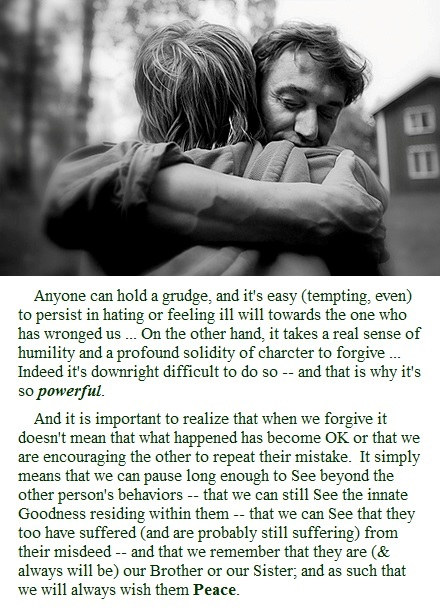Luke 5:24 … The authority to Forgive (05/27/17)
“The Son of Man has authority on Earth to forgive sins”
~ Jesus (Luke 5:24)
First & foremost, it is extremely important for all earnest students of the Scriptures to realize that Jesus was almost never referring to himself alone whenever he mentioned “the Son of Man.” In other words, that he is certainly not telling his listeners here that he alone “has the authority on Earth to forgive sins.” Indeed, to do so would not only have dramatically diminished the ultimate authority he openly & vehemently vested in his heavenly Father (see Mark 10:18 & John 8:50-54 et al), but it would have also been the epitome of arrogance (see also Matthew 26:64, Mark 14:62, Luke 22:69) — and this when humility was for Jesus the most staunchly encouraged of all virtues (see Matthew 8:20, Matthew 18:3-4, Matthew 23:12 et al); which would have made him a blatant hypocrite – and hypocrisy he clearly abhorred over all other human failings (see Matthew 6:5, Matthew 7:1-5, Matthew 7:15, Matthew 7:21-23, Matthew 23, Luke 6:46, Luke 12:2, Luke 16:15, Luke 20:46-47, John 8:4-9 et al).
No, when Jesus used the term “the Son of Man” he was almost always referring to all of his listeners – and indeed, to all of us as well. In truth, how else could he be taken seriously when he said “Truly I tell you, there are some standing here who will not taste death before they see the Son of Man coming in his kingdom” (Matthew 16:28), for if Jesus was speaking of himself as “the Son of Man” at this time, then he quite obviously misspoke (something the Messiah could never do).
And yet that is not who he spoke of when using this term, and he even came right out and said as much to his disciples a few verses prior (“Now when Jesus came into the district of Caesarea Philippi, he asked his disciples, “Who do people say that the Son of Man is?” And they said, “Some say John the Baptist, but others Elijah, and still others Jeremiah or one of the prophets.” And so he asked them, “But who do you say that I am?” And Simon Peter answered, “You are the Messiah, the Son of the living God.” at which point Jesus seemed to congratulate Peter for noting that Jesus was indeed an embodiment of “the living God” a la John 14:20-26, and yet immediately thereafter he “sternly ordered the disciples not to tell anyone that he was the Messiah” ~ Matthew 16:13-20).
Just as importantly, this interpretation (namely, reading “the Son of Man” as relating to all of humanity, not only to Jesus Christ) happens to reconcile dozens of other seeming contradictions and apparent theological inconsistencies in the Scriptures as well – for one, how Jesus could tell us all to forgive everyone (the “seventy” of Matthew 18:21-22, referencing the 70 nations of humanity found in Genesis 10) without limit and without exception (the “times seven” of that same passage, referencing the “completeness” with which we are to forgive them all) while seemingly claiming in Luke 5 that he alone had the ability to do the same.
And this interpretation also explains his claim that we all have the power to forgive the sins of others, and thereby rectify the sins of ourselves (see “if you forgive others their trespasses, your Heavenly Father [who resides within you – see John 14:20] will also forgive you yours” ~ Matthew 6:14) … And it also harmonizes him telling others that “the Son of Man did not come to be served, but to serve” (Matthew 20:28), a phrase that resonates in perfect harmony with the primary message of his entire ministry – namely, his Gospel; that the Kingdom of Heaven was already “at hand” (Matthew 10:7), and that anyone could enter the same by persistently & selflessly serving others (Matthew 24:12-14) – especially one’s enemies (i.e. those who obviously needed forgiveness more than most; see Matthew 5:43-49 & Luke 10:29-37).
Yes, Jesus did want to be followed (i.e. for us all to emulate his teachings and enliven his Way of selfless LOVE – see Matthew 7:21-24, Matthew 16:24 & John 13:15-17 et al), and yet he also made it extremely clear that he did NOT want to be worshipped in any way, shape, or form (see Luke 18:19, John 5:41, John 7:16, John 12:44 et al).
And this all actually makes perfect sense – after all, if neither Jesus nor his heavenly Father would ever condemn sinners (see John 5:22, John 8:15 & John12:47-48), why would they be the only ones with the ability to forgive the same?





 ;
;